Detroit's Stroh's Brewing Company--With Its Days of Future Passed
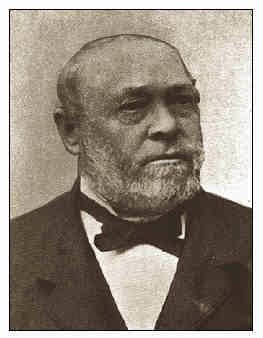 Founder Bernhard StrohAvoiding the German Revolution of 1848, Bernhard Stroh emigrated to the United States with knowledge of the brewing trade from his father Georg Friedrich Stroh--landowner and inn keeper. He was taught the Pilzen method of brewing a light-lager beer. In 1850--at the age of twenty-eight--Stroh established his basement brewery operation in Detroit with a $150 investment. Immediately, he started brewing Bohemian-style lager beer in copper-clad kettles that promoted the carmelization of the wort--unfermented beer--that made the beer lighter without reducing the flavor.
Founder Bernhard StrohAvoiding the German Revolution of 1848, Bernhard Stroh emigrated to the United States with knowledge of the brewing trade from his father Georg Friedrich Stroh--landowner and inn keeper. He was taught the Pilzen method of brewing a light-lager beer. In 1850--at the age of twenty-eight--Stroh established his basement brewery operation in Detroit with a $150 investment. Immediately, he started brewing Bohemian-style lager beer in copper-clad kettles that promoted the carmelization of the wort--unfermented beer--that made the beer lighter without reducing the flavor.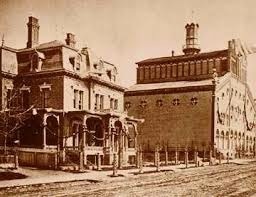 Stroh's home and first brewery buildingStroh's beer was sold door-to-door in beer buckets from a wheelbarrow, but soon horse-drawn wagons would be delivering his authentic German beer across town in barrels. Bernhard Stroh expanded his business in 1865 and adopted the heraldic lion emblem from the Kyrburg Castle in Germany. The lion icon is still visible in Stroh's product labeling.
Stroh's home and first brewery buildingStroh's beer was sold door-to-door in beer buckets from a wheelbarrow, but soon horse-drawn wagons would be delivering his authentic German beer across town in barrels. Bernhard Stroh expanded his business in 1865 and adopted the heraldic lion emblem from the Kyrburg Castle in Germany. The lion icon is still visible in Stroh's product labeling.Oldest son Bernhard Stroh Jr. assumed leadership of the brewing business when his father died on June 28, 1882 at the age of 59. The company patriarch was buried at Elmwood Cemetery in Detroit, Michigan. Bernhard Jr. introduced pasteurization and refrigerated rail cars which increased the shelf-life of their product and broadened their markets. Stroh's became the Detroit area's signature beer.
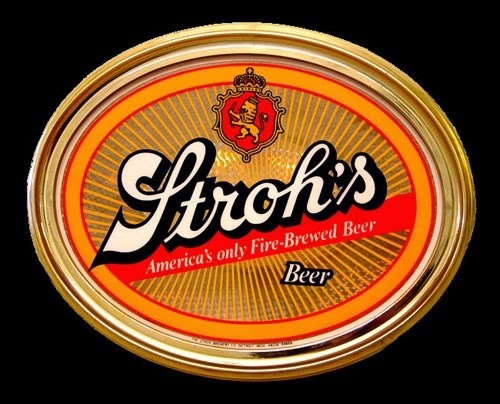
In 1908, Julius Stroh took over the family business from his brother. After a celebrated tour of Europe's finest breweries, Julius introduced direct flame--rather than stream--to heat the copper kettles. The company motto became "America's Only Fire-Brewed Beer" and part of the brand's labeling.
Prohibition was tough on the beer brewing industry and many breweries closed across the country. Rather than shut down and abandon their loyal workers, the company diversified and made near-beer (non-alcoholic), soft drinks, and ice cream. It is not unlikely that Stroh's Brewery may have made specially-ordered batches of the Real McCoy for Detroit's vast Speakeasy network. The country may have been dry, but Detroit was awash in booze. After Prohibition, the business grew and Stroh's became a regional favorite.
 What Detroiters recognize as Stroh's.A statewide strike halted beer production in 1958 which gave national brands a foothold in the Michigan beer market. In the 1960s, the Stroh family wanted to move the company into the national arena. They bought the Goebel Brewing Company--their rival across the street--in 1964. This increased Stroh's brewing capacity and solved the company's short term growing pains. Some twenty years later, Stroh's was sold in seventeen states. They needed even more brewing capacity, so they bought Schaefer Brewing Company--that had recently gone belly-up in the Miller beer advertising wars.
What Detroiters recognize as Stroh's.A statewide strike halted beer production in 1958 which gave national brands a foothold in the Michigan beer market. In the 1960s, the Stroh family wanted to move the company into the national arena. They bought the Goebel Brewing Company--their rival across the street--in 1964. This increased Stroh's brewing capacity and solved the company's short term growing pains. Some twenty years later, Stroh's was sold in seventeen states. They needed even more brewing capacity, so they bought Schaefer Brewing Company--that had recently gone belly-up in the Miller beer advertising wars.Then in 1982, Stroh's bought the Schlitz Brewing Company to become America's third-largest brewer--producing many well-known brands like Goebel, Schaefer, Schlitz, Old Milwaukee, Colt 45, and many others. In 1985, the 135-year-old-brewery on the East Side was simply outdated and had no room to expand. The following year it was imploded--a better fate than many of Detroit's factory ruins.
The Stroh's company business plan was to buy up struggling breweries and drive up the company's market share. Stroh's $500 million heavy debt load to buy Schlitz weakened the company's financial position and left them cash poor to compete with the onslaught of Anheuser-Busch and Miller Brewing Company's national marketing campaigns.
In 1990, Coors moved past Stroh's as America's #3 brewer. Stroh's market share dropped 50%. Beer analysts felt that Stroh's came to the light-beer party late. In 1973, Miller Brewing created Miller Lite beer and used macho football players and "tough guys" like pulp-fiction author Mickey Spillane. Miller's "Tastes Great/Less Filling" debate was a stroke of marketing genius. The Budweiser Clydesdales were a potent marketing image for Stroh's to compete with as well.
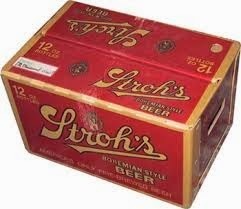
From the beginning of the company, Stroh's catered to working-class tastes at working-class prices. But Joe Six-Pack had moved on. Beer marketing shifted away from the product and onto the drinker. Advertising slogans like "This Bud's for You" and "It's Miller time--You earned it!" had great appeal to blue-collar beer drinkers. Coors' Silver Bullet promotion was the last straw.
In 1999--unable to compete in the twenty-first century--the 149 year-old brewer closed, and its assets were broken up and sold for the sum of their parts to Pabst Brewing and Miller Brewing companies. Many of the Stroh's brands were discontinued or sold off to other companies. Pabst acquired the well-known brands Colt 45, Schlitz, and Old Milwaukee--Miller got Mickey's Malt Liquor and the Henry Weinhard's line of beers.
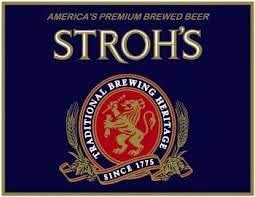 Today's Stroh's is produced by Miller Brewing Company. They don't use the special open-flame copper kettles, and the taste reflects the difference. The traditional Stroh's label read "America's Only Fire-Brewed Beer," but now it reads "America's Premium Brewed Beer."
Today's Stroh's is produced by Miller Brewing Company. They don't use the special open-flame copper kettles, and the taste reflects the difference. The traditional Stroh's label read "America's Only Fire-Brewed Beer," but now it reads "America's Premium Brewed Beer."As for the Stroh's family legacy, somehow the seventh generation has managed to lose over $700 million. Forbes magazine reports that by 2008, the family fortune was completely tapped out. Detroit's Pfeiffer Brewery and Johnny Pfeiffer
Published on October 03, 2020 09:28
No comments have been added yet.



